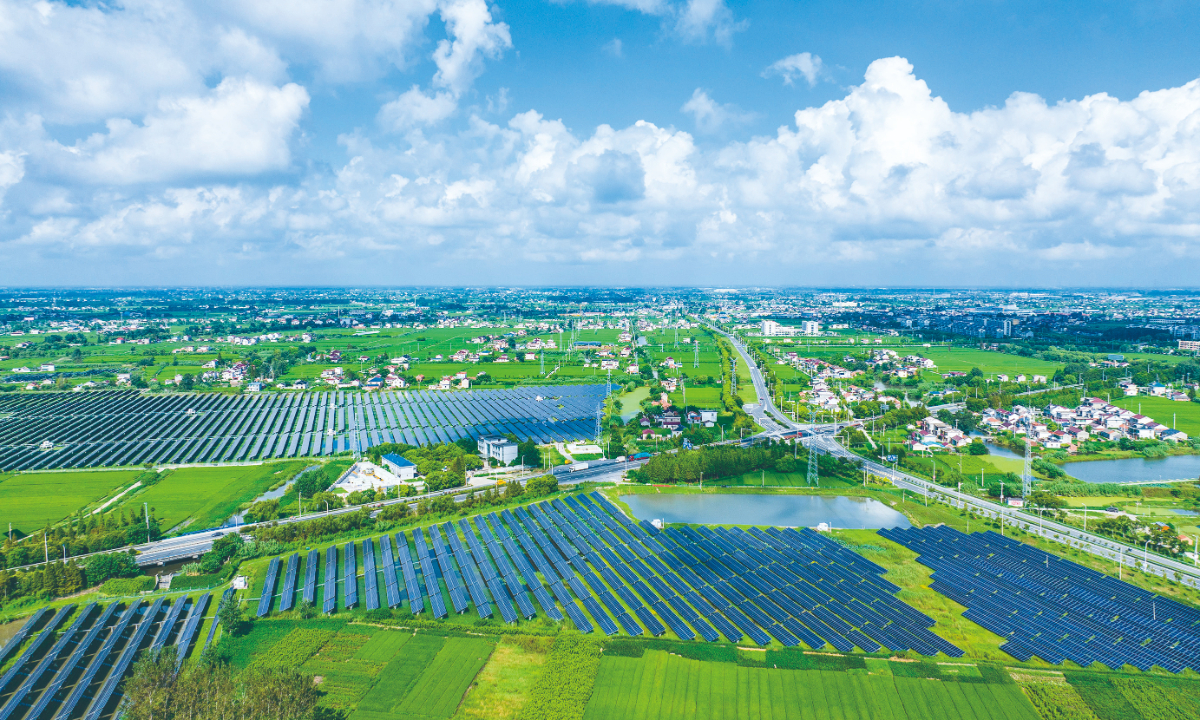

A photovoltaic power station project in Nantong, East China’s Jiangsu Province Photo: VCG
Lately, some American politicians have again hyped China's "overcapacity," attempting to exert pressure on China and shift the blame of the US' domestic industrial crisis onto China.
To simply claim that China's green industry, specifically the electric vehicles (EVs), solar panels and lithium batteries, is experiencing "overcapacity," or even to consider planned capacity as actual capacity, is inconsistent with the reality.
This approach deliberately undermines China's significant contributions to the global low-carbon transformation and green development.
Looking at the rhetorics made by some US politicians, there is a tendency to wantonly and simplistically place "overcapacity" label on Chinese economy, in an attempt to muddy the waters and stigmatize China's international image.
The "overcapacity" accusation reflects the complex attitude of Western countries, led by the US, toward China's economic rise. In the first half this year, China reported GDP growth of 5.0 percent year-on-year, with a 3.7-percent rise in retail sales and a 6.1-percent increase in total merchandise trade.
While external demand is indeed stronger, it is inaccurate, as some American politicians claim, to assert that China's economy is "underperforming."
Foreign trade, as a bridge connecting China's economy with the global economy, has always been an important driving force for China's economic growth. It not only aligns with China's unwavering policy direction of opening-up and integrating into the global division of labor, but also provides the world with more high-quality and cost-effective products and services, injecting new momentum into the global economy.
Fluctuations in global new-energy supply and demand are primarily the result of normal market factors. China's advantages in the new-energy industry have been shaped through many years' sufficient market competition.
Slandering Chinese new-energy products as a "global threat" is merely an attempt by the US politicians to politicize economic and trade issues, arbitrarily linking economic and trade issues with security, and trying to maintain the US' industrial dominance in the world.
Washington's coercion through protectionist policies reflects its underlying "America First" approach, attempting to shift its domestic crises onto other countries.
Similar to the 1980s, when faced with Japan's competitive advantages in industries such as textiles, automobiles and semiconductors, the US resorted to imposing anti-dumping tariffs, forced Japan to voluntarily limit exports, and expanded import, which helped maintain the US' hegemony.
The ongoing accusation against China by hyping the "overcapacity" claim is another manifestation of the US' zero-sum thinking and hegemonic logic. The figures clearly indicate that the US lacks justification to tarnish other countries' global image.
In the face of increasingly severe global climate change, actively developing and deploying new-energy products is of great significance for achieving carbon neutrality goals, mitigating climate change and realizing a green transition.
The fact is the world's production capacity for new-energy products is far from meeting the steady growth in market demand. Take new-energy vehicles (NEVs) as an example. According to estimates by the International Energy Agency, global demand for NEVs will reach 45 million units by 2030, which would be 4.5 times that of 2022.
On the basis of meeting domestic demand and promoting the achievement of carbon neutrality goals, China's new-energy products are also continuously making important contributions to addressing global climate change.
It is evident that the accusation by some Western countries that China's "overcapacity" is affecting the world economy is false. China's new-energy products are not excessively exported, and they are aimed at meeting global demand for the green transition. China's new-energy products contribute Chinese strength to promoting the green transition and development for many developed and developing countries around the world.
The authors are scholars at Institute of Economics, the Chinese Academy of Social Sciences. bizopinion@globaltimes.com.cn



